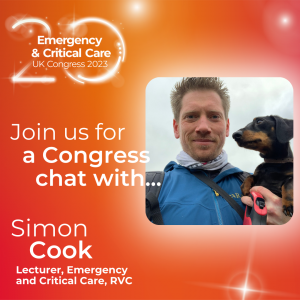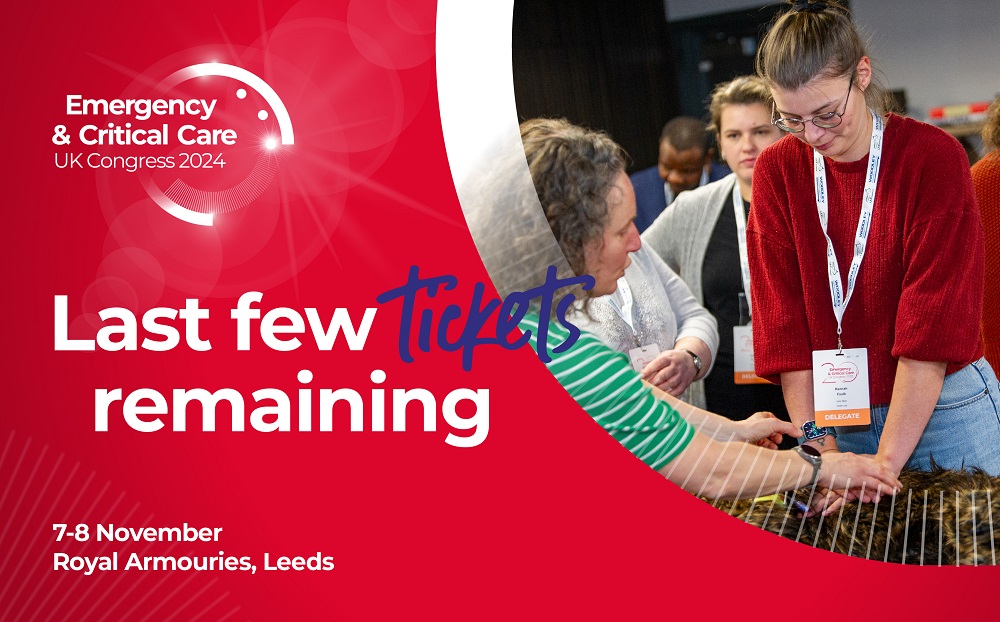Simon Cook, a lecturer in Emergency and Critical Care at the Royal Veterinary College, will be giving three lectures at this year’s prestigious Vets Now Emergency and Critical Care Congress. It’s the 20th year of the popular event and it takes place at the Royal Armouries, Leeds, on November 9 and 10.
What’s your veterinary background?
I graduated from the University of Bristol in 2011, did a rotating internship at the RVC and then spent a couple of years in private practice at a busy, 24-hour small animal hospital. I then came back to the RVC to do my residency in emergency and critical care between 2014 and 2017, before going back into practice for another year. I’ve been back here as a lecturer, doing both clinics and research, for the past five years.

What led to your interest in ECC?
Visiting the RVC as an undergrad in my final year and then doing the internship really sent me down this route. I can still remember an especially busy Christmas week here as a student which was both carnage and a lot of fun!
My current interests include aspiration pneumonia, which is an area where we’re starting to make a bit of progress, extracorporeal therapies and Point of Care Ultrasound.
You have three lectures at Congress. Tell us about How to interpret a clinical journal, followed by one paper that changed my life.
I think this will be of particular interest to those enrolled in or practicing with certificates, but it’s a broad area so it will equally apply to GPs. Together with Dr Erica Reineke I’ll basically be trying to demystify the literature and at the same time encouraging being a bit more cynical about what’s published. Being able to tease apart what is useful or less useful is quite an underrated skill. It’s easy to take a journal article at face value and over-interpret it.
Then, rather than one specific article, we’ll be choosing a selection that have either had a big impact on our practice and teaching, or that we think may do that for delegates.
Your second is Diagnostics and diagnostic imaging following polytrauma. What’s useful, what’s not.
I love the radiographs we get in ER and ICU patients, and I think there’s a huge amount more to be interpreted than many people are aware, be they GPs or specialists. I’ll be talking through several radiographs I think have interesting findings which delegates will be able to take back to their practice.
We’ll do some radiography and some point of care ultrasound (POCUS), with a focus on anatomy which can be a stumbling block for some. Just as example it is easy to mis-interpret imaging findings in cats and dogs with pneumothorax, so we will look at that more closely.
And your third is Controversies in emergency surgery – put the knife down, you can’t cut yet.
I’ll be doing this alongside surgical specialist Barney Dean. Indications for, and timings of, surgical intervention are not always cut and dried. It’s common that cases require a genuinely multidisciplinary discussion before pursuing surgery. Using case examples, we’ll be talking about steps to stabilise patients pre-surgically, and when cases might even be better off without surgery at all!
Finally, how important is the Vets Now ECC Congress?
There is nowhere else in the UK you’ll have that concentration of ECC-biased content and delegates. It’s a brilliant environment for discussion of cases and sharing of experiences. The social component is excellent because having an informal learning environment is so important. I’ll be delighted to talk to delegates before/after a lecture about what they want to discuss, not just what I plan to talk about.

